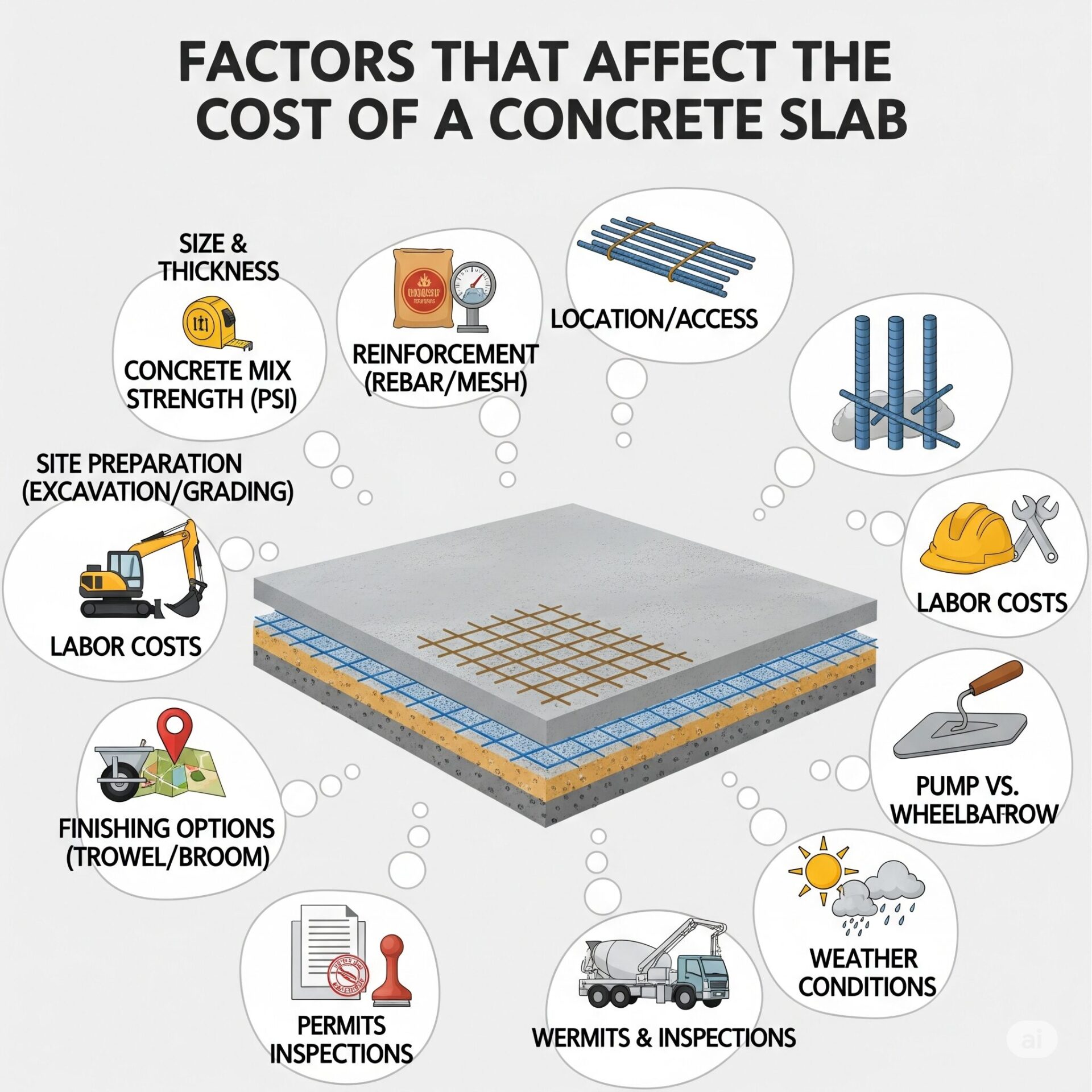Concrete is a durable and reliable material, widely used in everything from outdoor patios to structural foundations. However, costs can rise quickly if you are not prepared, especially if your project includes concrete foundation repair or site leveling. Understanding the full cost breakdown of a concrete slab, including factors like size, thickness, labor, and repair work, can help you avoid surprises and plan your budget more effectively. In this article, we’ll take a closer look at the factors that influence the cost of a concrete slab, including the size and thickness, the type of concrete, labor costs, and more.
You might like: Home Foundation Leveling: Best Methods & Repair Solutions
By the end of this guide, you’ll have a better idea of what to expect and how to get the most value for your money when it comes to installing a concrete slab. So, let’s get started!
What Is a Concrete Slab?
A concrete slab is a flat horizontal surface made from poured concrete, commonly used as a floor or foundation. You’ll find slabs in driveways, garages, patios, sidewalks, and homes. They can be monolithic (all poured at once) or stem wall slabs (more complex).
If your property already has a slab that’s damaged or sinking, you may need concrete foundation repair before you can build or renovate further.

Factors That Affect the Cost of a Concrete Slab
Before you can accurately estimate your concrete slab cost, it is important to understand the key factors that drive the overall price. From site prep to finish options, here’s what really affects your final bill:
1. Size of the Slab
The bigger the slab, the higher the cost, but not always proportionally. Larger jobs may benefit from bulk pricing, but overall, more square footage means more concrete, more labor, and more time.
Small slab (shed base, garden pad): $600–$2,000
Medium slab (patio, driveway): $2,500–$5,000
Large slab (garage floor, foundation): $6,000+
2. Slab Thickness
Standard concrete slabs are usually 4 inches thick, which works well for patios and walkways. But if your slab needs to support vehicles or structures, you’ll need 6 inches or more, which increases the concrete volume and cost.
More thickness = more materials = higher price
3. Materials & Reinforcement
The type of concrete mix, the grade of materials, and any reinforcement you use will significantly impact costs. For structural strength, you will likely need:
Rebar or wire mesh: Adds $0.50-$1.50 per sq ft
Vapor barriers, gravel base, or insulation (optional but beneficial in certain climates)
If you’re using additives, sealers, or special mixes (e.g., high-strength or quick-set), those come at a premium as well.
4. Site Preparation
This is often where unexpected costs sneak in. Preparation includes:
Excavation and leveling
Clearing trees or debris
Demolishing old concrete or pavement
If the site is sloped, rocky, or contains poor-quality soil, expect higher prep costs. And if you’re replacing a damaged or uneven slab, you might need concrete foundation repair before pouring the new one, especially if there is been structural movement or water damage.
5. Labor Costs
Labor is one of the biggest line items in your concrete slab budget. Rates vary depending on:
Project complexity
Crew size and experience
Your local market (urban areas = higher rates)
Need for specialized equipment, like mixers or finishing tools
More intricate projects, such as those with multiple pours, decorative edges, or leveling issues, will drive labor costs up.
6. Finishes and Decorative Add-ons
Want your slab to stand out or blend beautifully with your landscape? Custom finishes will cost extra:
Stamped concrete: +$8–$15 per sq ft
Polished concrete: +$3–$8 per sq ft
Stained concrete: +$2–$4 per sq ft
Sealing or color tinting: Additional cost per project
These finishes are optional but popular for patios, driveways, and indoor spaces where aesthetics matter.
7. Permits, Inspections & Hidden Fees
Don’t forget the behind-the-scenes costs:
Permit fees (varies by city/county)
Mandatory inspections in some areas
Waste removal or disposal of old materials
It is a good idea to ask your contractor upfront what’s included, and what is not.
Cost Breakdown Example (10×10 Concrete Slab)
| Item | Cost Estimate |
|---|---|
| Concrete (4″ thick) | $400-$600 |
| Labor | $300-$600 |
| Reinforcement (optional) | $100-$200 |
| Site Preparation | $100–$300 |
| Total | $900–$1,700 |
Disclaimer: Prices mentioned are average estimates based on 2025 data. Actual costs may vary by location, materials, and project specifics. Always consult a local contractor for accurate quotes.
Quick Tip: Repair vs. Replace
If you are dealing with cracks, sinking, or water pooling on an existing slab, consider concrete foundation repair instead of a full replacement. It’s often less expensive and extends the life of your current structure.
How to estimate the cost of a concrete slab
Now that you understand the various factors that can affect the cost of a concrete slab, let’s take a look at how to estimate the total cost. Here are the steps you’ll need to follow:
- Determine the size and thickness of the slab you will need.
- Choose the type of concrete you want to use, and factor in the cost of any reinforcement materials or additives.
- Estimate the cost of labor by determining the number of workers you’ll need, as well as the amount of time the project will take.
- Factor in the cost of any necessary equipment, as well as any permit fees or inspection costs.
- Add up all the costs to determine the total cost of the project.
Keep in mind that these are just rough estimates, and your actual costs may vary depending on a variety of factors. It’s always a good idea to get multiple quotes from different contractors to ensure you’re getting the best price.
Tips to save money on your concrete slab project
If you’re looking to save money on your concrete slab project, there are a few things you can do to keep costs down. Here are some tips:
Consider using a lower-grade concrete
While higher-grade concrete may be more durable and long-lasting, it’s also more expensive. If you’re on a tight budget, consider using a lower-grade concrete that is still suitable for your needs.
Do some of the work yourself
If you’re handy with tools and have some construction experience, you may be able to save money by doing some of the work yourself. Just be sure you know what you’re doing, as mistakes can be costly to fix.
Shop around for materials and labor
Don’t be afraid to shop around for the best prices on materials and labor. Get quotes from multiple contractors and suppliers to ensure you’re getting the best deal.
Plan ahead
Planning ahead can help you save money in the long run. By carefully considering the size and thickness of your slab, as well as the type of concrete you want to use, you can avoid costly mistakes and unnecessary expenses.
Hiring a professional vs. DIY
When planning a concrete slab project, one of the biggest decisions you’ll face is whether to do it yourself (DIY) or hire a professional concrete contractor. Each option comes with pros and cons, and the right choice depends on the size, purpose, and complexity of your slab.
If you’re pouring a small concrete slab, like for a garden bench, shed base, or walkway and you’re confident using tools, DIY concrete slab installation can save money. With the right preparation and equipment, experienced DIYers can handle basic projects successfully.
However, for structural slabs, such as those used in garage floors, driveways or home foundations, it’s usually smarter to hire a licensed concrete contractor. These projects often require proper grading, reinforcement, and precise curing to avoid problems like cracking, poor drainage, or even building code violations.
While DIY concrete pouring might seem budget-friendly at first, mistakes can be expensive to fix and may compromise the safety and durability of the structure. A professional brings expertise, quality assurance, and the tools needed to get it right the first time.
Conclusion
Installing a concrete slab can be a significant investment, but understanding the cost breakdown can help you plan and budget your project more effectively. By considering the various factors that can affect the cost, estimating the total cost, and following some simple tips to save money, you can ensure that your project is a success and that you get the most value for your money. Whether you choose to hire a professional contractor or tackle the project yourself, remember to always prioritize safety and quality.
📞 Need Concrete Foundation Repair?
Whether you’re in Houston, Sugar Land, Spring, Richmond, Clear Lake, Pearland, or Webster , we’ve got you covered!
We specialize in concrete foundation repair
and foundation repair services tailored to your local soil conditions and building requirements.
👉 Contact Us Today or Call Now R.L. Nelson Foundation Solutions – Foundationrepair.com for a free, no-obligation estimate in your area.




